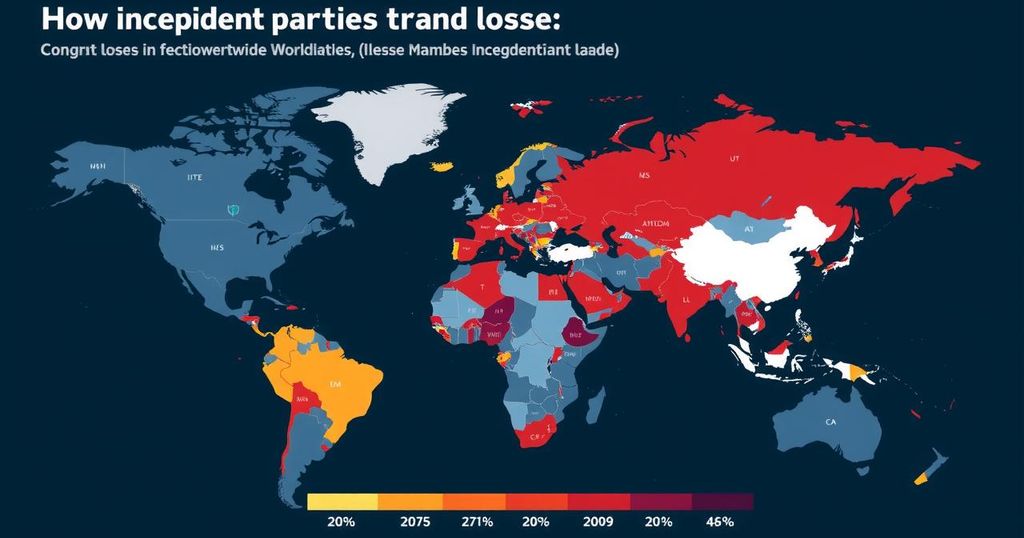Global Trend of Electoral Defeats: Insights from the 2023 Elections

The article analyzes the significant electoral losses experienced by incumbent parties worldwide, including the Democrats, after the 2023 elections, highlighting over 80% of democracies that saw incumbents lose ground. It discusses the relative performance of the U.S. economy and the factors contributing to the Democratic Party’s outcomes, noting trends of voter discontent and the focus on security in successful campaigns globally.
As election analyses commence in the wake of Vice President Kamala Harris’s campaign, the scrutiny reveals a noteworthy trend: incumbent parties around the globe, not just the Democrats, have suffered significant electoral defeats. Despite these challenges, it is crucial to acknowledge that Democrats experienced comparatively minor losses when juxtaposed with the severity of defeats faced by many incumbent parties worldwide. This broader trend indicates a growing discontent among voters, evident in over 80 percent of democracies that held elections in 2023, where incumbent parties either lost seats or diminished their vote share. The phenomenon is not isolated, as history records significant electoral shifts in multiple nations. In Japan, Botswana, South Africa, and Senegal, long-standing incumbent parties faced historic losses or transitioned to power-sharing arrangements. Similarly, voter sentiment in Sri Lanka surged, leading to a decisive victory for the opposition shortly after overwhelming protests against the government. European elections mirrored this trend, with citizens across 14 countries issuing strong reprimands to established governments. This collective electoral backlash becomes increasingly notable against the backdrop of incumbency’s traditional advantages. Despite the prevailing global sentiment against incumbents, the Democrats’ performance in the United States appears relatively resilient. According to analysis by the Financial Times, the Democrats incurred one of the least severe losses among high-income countries during this election period. Several swing states were narrowly won, and prospects suggest that the Democrats might either maintain their ground or potentially gain seats in the House of Representatives. One underlying factor contributing to the Democrats’ more favorable outcome may be attributed to the strength of the United States economy compared to other nations. While inflation and slow growth plague many countries post-COVID-19, the U.S. economy showcases robust GDP growth and increasing real wages, positioning it as an exception to global trends. Nonetheless, public perception of economic conditions remains complex; critical issues such as inflation and housing costs have overshadowed more positive economic indicators in the electoral discourse. Incumbent governments that managed to secure re-election did so not due to economic prowess, but through campaigns heavily focused on security and national stability. Nations like Mexico, Finland, and Moldova capitalized on voter concerns regarding safety and external threats, a strategy that differed from the campaign landscape in the U.S., where national security concerns did not gain similar traction, despite immigration being a prominent voter issue. Ultimately, the political landscape reflects widespread voter dissatisfaction transcending borders. Economic anxiety and the sentiment of discontent underscored the Democrats’ challenges in 2023. However, as the electoral cycle continues, a glimmer of hope for Democratic prospects may arise, as they prepare to transition from incumbency in the upcoming elections.
The article discusses the electoral challenges faced by incumbent parties globally amidst rising voter dissatisfaction, with a focus on the analysis of Vice President Kamala Harris’s campaign following the 2023 elections. It highlights the significant pattern of losses experienced by incumbents in democracies worldwide, drawing parallels to the situation in the United States. Themes of economic performance, voter priorities, and security issues in electoral outcomes are examined, providing context for understanding the electoral dynamics.
In summary, the electoral defeats faced by incumbent parties across democracies globally signal a significant voter backlash and dissatisfaction with governance. The Democrats, while experiencing losses, fared better relative to other incumbents worldwide, attributed in part to favorable economic indicators in the U.S. Moving forward, the Democrats may find themselves in a more favorable position in future elections without the burden of incumbency, as global trends reflect increasing public demand for change.
Original Source: abcnews.go.com







